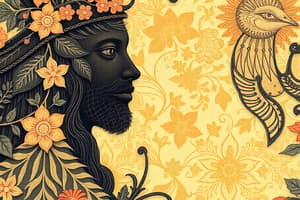Podcast
Questions and Answers
What is a leader?
What is a leader?
Someone who can influence others and has managerial authority.
What is leadership?
What is leadership?
The process of leading a group and influencing that group to achieve its goals.
What are the three major contingency theories of leadership?
What are the three major contingency theories of leadership?
- Fiedler Model (correct)
- Situational Leadership Theory (correct)
- Leader Trait Theory
- Path-Goal Model (correct)
Match the following leadership styles with their descriptions:
Match the following leadership styles with their descriptions:
What are leadership trait theories focused on?
What are leadership trait theories focused on?
Which leadership behavior theory places emphasis on interpersonal relationships?
Which leadership behavior theory places emphasis on interpersonal relationships?
The __________ style of leadership was found to be the most effective in early studies.
The __________ style of leadership was found to be the most effective in early studies.
Leaders need to demonstrate self-doubt to convince followers.
Leaders need to demonstrate self-doubt to convince followers.
Which trait is NOT associated with Leadership Trait Theories?
Which trait is NOT associated with Leadership Trait Theories?
What does the Managerial Grid measure?
What does the Managerial Grid measure?
Flashcards are hidden until you start studying
Study Notes
Overview of Leadership in Business Management
- Leaders influence others and hold managerial authority; leadership is the process of guiding a group to achieve goals.
- Early theories of leadership focus on traits and behaviors, while contemporary theories have evolved to address situational and environmental factors.
Leadership Trait Theories
- Key Traits of Effective Leaders:
- Drive: High effort level, ambition, persistence, and energy.
- Desire to Lead: Strong urge to influence others and assume responsibility.
- Honesty and Integrity: Build trust through consistency and truthfulness.
- Self-Confidence: Instills confidence in followers, reduces self-doubt.
- Intelligence: Ability to synthesize information, create visions, and solve problems.
- Job-relevant Knowledge: In-depth understanding of industry specifics aids in decision-making.
- Extraversion: Energetic and sociable, fostering assertiveness and openness.
Leadership Behavior Theories
-
University of Iowa Studies:
- Leadership styles include autocratic, democratic, and laissez-faire; democratic style generally found most effective.
-
Ohio State Studies:
- Consideration: Being attentive to followers' ideas and emotions.
- Initiating Structure: Organizing work and relationships to achieve goals.
- Leaders who achieve high consideration and structure see increased performance.
-
Michigan University Studies:
- Employee-Oriented: Prioritizes interpersonal relationships, leading to higher job satisfaction.
- Production-Oriented: Focuses on technical task execution; less effective in promoting satisfaction.
-
Managerial Grid:
- Measured concern for people and concern for production on a scale of 1 to 9.
- Optimal leadership style is 9,9, combining high concern for both production and people.
Contingency Theories
- Fiedler Model: Considers the interplay between leadership style (task-oriented vs. relationship-oriented) and situational context.
- Situational Leadership Theory (SLT): Adapts leadership style based on the maturity and competence of followers.
- Path-Goal Model: Leaders clarify goals and outline paths for followers to achieve them, enhancing motivation and satisfaction.
Contemporary Issues in Leadership
- Focus on adapting leadership styles to dynamic environments and diverse workforce needs.
- Emphasis on ethical leadership and social responsibility in business practices.
Studying That Suits You
Use AI to generate personalized quizzes and flashcards to suit your learning preferences.




